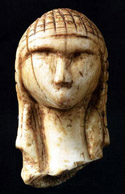Anthropology, Department of

Department of Anthropology: Faculty Publications
Document Type
Article
Date of this Version
1997
Citation
1997 Author
Abstract
As I have done considerable research among the Yanomamö,1 it was with anticipation that I received notice of Alcida Ramos' publication of Sanumá Memories. This work is a useful contribution to the large and still expanding research on the Yanomamö, an Amazonian people who have become a classic case study for anthropology and the social sciences. They are probably the most widely read about tribal people in the world, largely a consequence of Napoleon Chagnon's immensely popular ethnography Yanomamö: The Fierce People (first published in 1968 and the most recent edition in 1992).
The Yanomamö have become a focal point for theoretical debates concerning the causes of warfare among tribal people, the promise of evolutionary biological theory in the behavioral sciences, and most recently, and lamentably, they are internationally known as victims of grave human rights violations. Ramos' Sanumá Memories was first published in Portuguese in 1990 as an update of her 1972 doctoral dissertation (The Social System of the Sanumá of Northern Brazil, University of Wisconsin) supplemented by several return visits to the Sanumá (as recently as 1992) yielding additional chapters. A number of the chapters have been published as journal articles in both Portuguese and English.
Based on the work of Ernesto Migliazza, the Yanomamö are divided into four ethnolinguistic groups: the Sanumá or Sanema with 3,200 speakers in about 100 villages, threequarters of which are in Venezuela; the Yanomamö with 11,700 speakers in 171 villages, with about 80 percent in Venezuela; Yanomam with 5,300 speakers in 64 villages, nearly all of which are in Brazil; and the Ninam (or Yanam), with perhaps as many as 850 speakers equally divided in Brazil and Venezuela. The work under review here is the most systematic account of we have on Sanumá social organization. Other major works on the Sanumá by Kent Taylor and Marcus Colchester focus on ethnobiology, ecology, and economics.


Comments
Vol.4 1997 Journal of Political Ecology